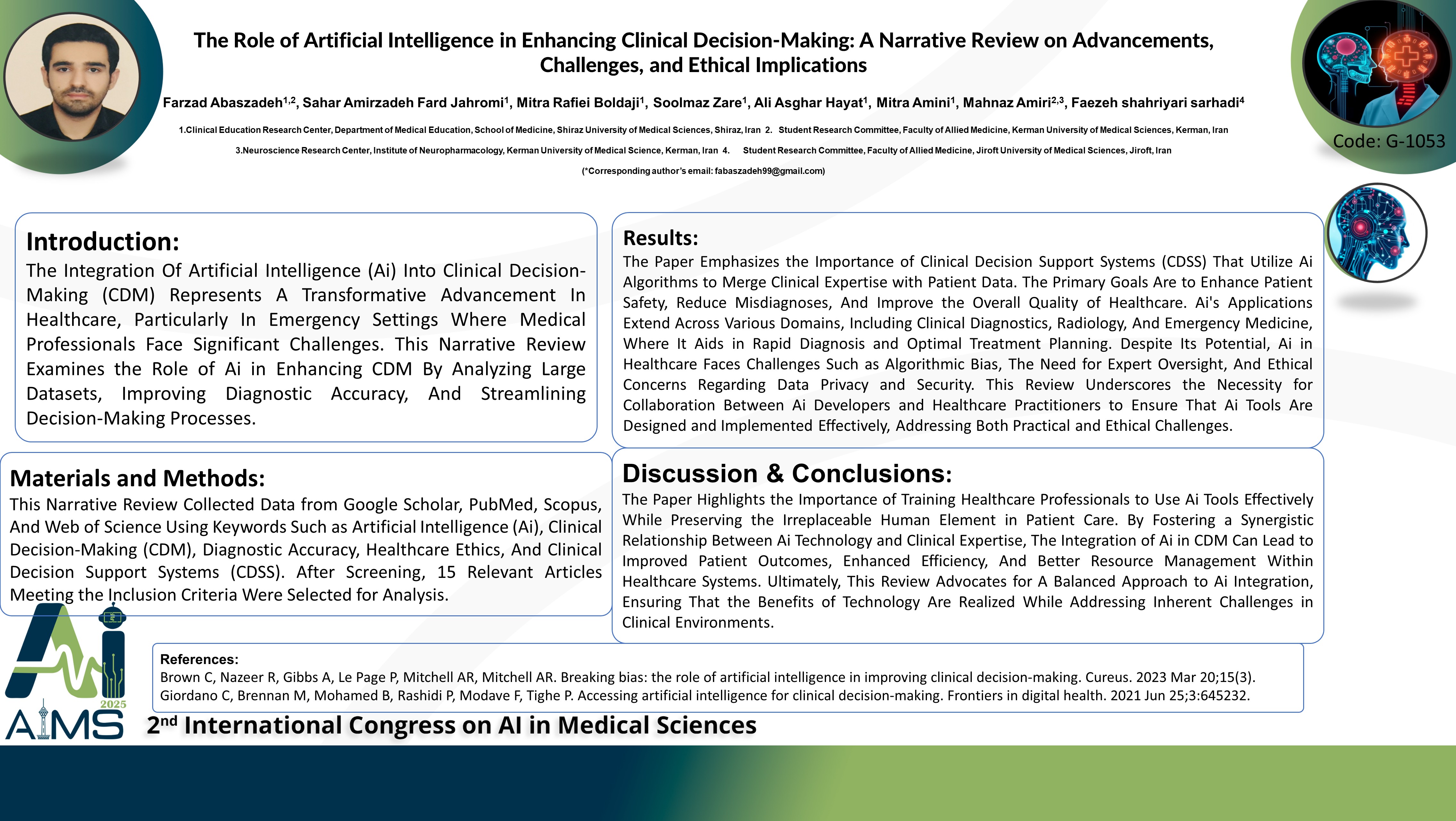The Role of Artificial Intelligence in Enhancing Clinical Decision-Making: A Narrative Review on Advancements, Challenges, and Ethical Implications
Code: G-1053
Authors: Farzad Abaszadeh * ℗, Sahar Amirzadeh Fard Jahromi, Mitra Rafiei Boldaji, Soolmaz Zare, AliAsghar Hayat, Mitra Amini, Mahnaz Amiri, Faezeh Shahriyari Sarhadi
Schedule: Not Scheduled!
Tag: Intelligent Virtual Assistant
Download: Download Poster
Abstract:
Abstract
Background And Aims: The Integration Of Artificial Intelligence (Ai) Into Clinical Decision-Making (CDM) Represents A Transformative Advancement In Healthcare, Particularly In Emergency Settings Where Medical Professionals Face Significant Challenges. This Narrative Review Examines the Role of Ai in Enhancing CDM By Analyzing Large Datasets, Improving Diagnostic Accuracy, And Streamlining Decision-Making Processes. Method: This Narrative Review Collected Data from Google Scholar, PubMed, Scopus, And Web of Science Using Keywords Such as Artificial Intelligence (Ai), Clinical Decision-Making (CDM), Diagnostic Accuracy, Healthcare Ethics, And Clinical Decision Support Systems (CDSS). After Screening, 15 Relevant Articles Meeting the Inclusion Criteria Were Selected for Analysis. Results: The Paper Emphasizes the Importance of Clinical Decision Support Systems (CDSS) That Utilize Ai Algorithms to Merge Clinical Expertise with Patient Data. The Primary Goals Are to Enhance Patient Safety, Reduce Misdiagnoses, And Improve the Overall Quality of Healthcare. Ai's Applications Extend Across Various Domains, Including Clinical Diagnostics, Radiology, And Emergency Medicine, Where It Aids in Rapid Diagnosis and Optimal Treatment Planning. Despite Its Potential, Ai in Healthcare Faces Challenges Such as Algorithmic Bias, The Need for Expert Oversight, And Ethical Concerns Regarding Data Privacy and Security. This Review Underscores the Necessity for Collaboration Between Ai Developers and Healthcare Practitioners to Ensure That Ai Tools Are Designed and Implemented Effectively, Addressing Both Practical and Ethical Challenges. Conclusion: The Paper Highlights the Importance of Training Healthcare Professionals to Use Ai Tools Effectively While Preserving the Irreplaceable Human Element in Patient Care. By Fostering a Synergistic Relationship Between Ai Technology and Clinical Expertise, The Integration of Ai in CDM Can Lead to Improved Patient Outcomes, Enhanced Efficiency, And Better Resource Management Within Healthcare Systems. Ultimately, This Review Advocates for A Balanced Approach to Ai Integration, Ensuring That the Benefits of Technology Are Realized While Addressing Inherent Challenges in Clinical Environments.
Keywords
Artificial Intelligence, CDM, CDSS, Healthcare Ethics
